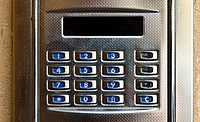Access control providers continue to develop innovative new technologies that deliver greater value and control for end users, but technology is only one part of the access control story. Equally important is what happens before, during and after the sale, so that you get the most out of your access control system. What are the 10 things that you should demand and receive from your access control provider?
- Customer Service and Support: Access control systems require ongoing service and support, and one true measure of a vendor is what they can – and will – do to address and accurately fix any issues in a timely manner. With their more heavily structured internal reporting and support protocols, a large company could take longer to fix a problem, and the associated cost could be large. A smaller, more agile provider can work closely with you to focus on and resolve issues much more quickly and at much less expense. And a smaller provider can take the time to explain how and why the technology works the way it should work.
- Mobility: Mobile applications are critical for access control, to add convenience for employers and employees alike. They offer capabilities including mobile credentialing and de-credentialing which greatly facilitate management of personnel.
- Flexibility: Because no two access control applications have identical requirements, an off-the-shelf solution may not be sufficient for your needs. Your provider should be willing and able to accommodate customization and your specific needs.
- Availability: You’ll have numerous ways to contact your vendor, but what if you can’t reach them? Delays compromise security, so you deserve a specific person that you can rely on when you need help the most, often when something requires immediate attention.
- Expertise: Your vendor should have the knowledge and expertise to help you make better and more confident decisions about an access control installation.
- Training: Post-sale and in-person training is important, as it allows you and your team to learn the ins and outs of your specific system, and provides you with the opportunity to discuss and ask questions about any concerns or issues related to the product, system or anything else as you go forward.
- Cybersecurity: Your access control vendor should be able to show their knowledge and expertise with compliance for U.S. government requirements including the United States Department of Defense (DoD) Risk Management Framework (RMF). The RMF requires companies and organizations to apply risk management best practices to IT systems by implementing defined activities, general tasks and a management structure that can prevent Denial of Service (DoS).Further, the provider needs to have taken meaningful steps to harden equipment and strengthen software against potential cyber breaches.
- Integration: Your access control provider should explain the benefits of integration into your security systems, as one credential can allow access to doors, data and cloud applications, with security and tracking incorporated into every user action. This high-level integration can also be used to trigger automated tasks like time and attendance recording.
- Quality: The vital nature of security makes the quality and reliability of solutions critical. Your access control provider should be able to show how it has made investments in machinery, equipment and processes that allow them to produce solutions that deliver high-quality products.
- The Cloud: The emergence of Access Control as a Service (ACaaS) as a cloud-based offering will potentially bring new even higher levels of service and capabilities into the market, and your provider should be able to discuss the benefits of a cloud-based system.
Your chosen provider should be able to provide you with these 10 requirements – if you’re speaking to someone who isn’t able to do that, you might want to look a bit further to be sure you have the best access control provider for your business.



